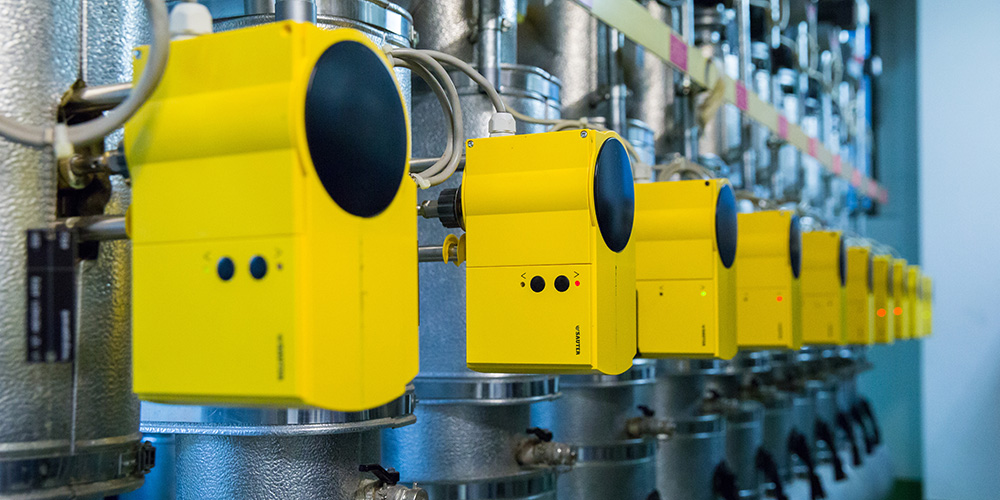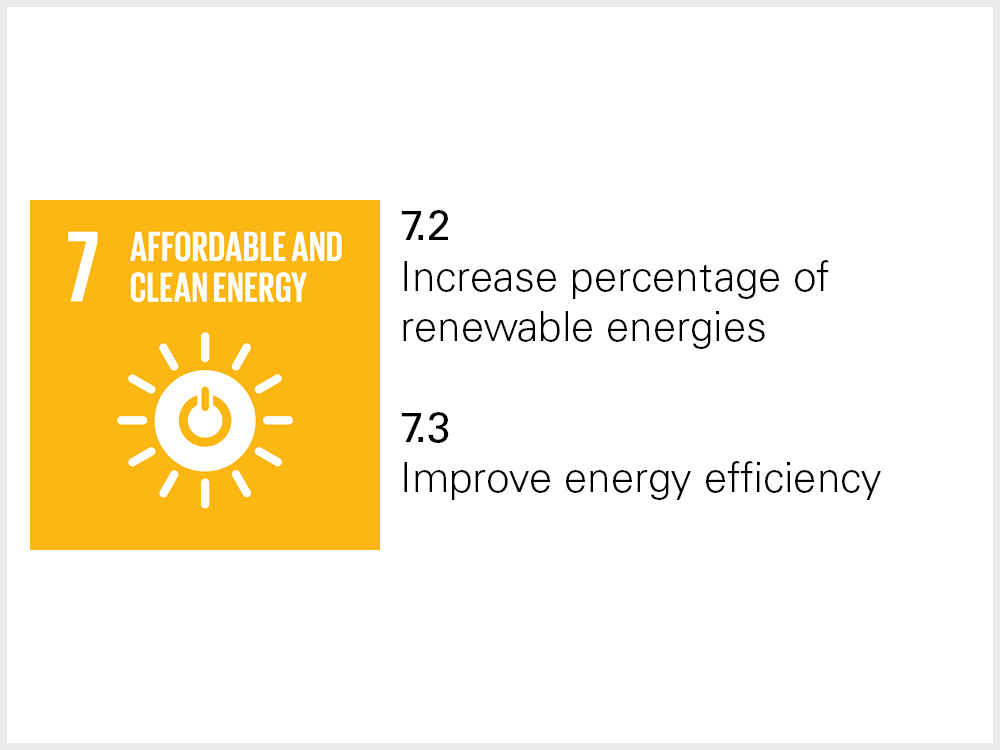Energy

The University of Basel registered an energy consumption of 55.1 GWh in 2019¹, corresponding approximately to the consumption of 3,300 households² in Switzerland. Energy consumption in 2020 dropped by more than 8 % compared with the previous year as a result of the coronavirus pandemic. The switch from nuclear to hydropower was also an important step towards a more sustainable energy supply.
The University of Basel takes different approaches to ensure an environmentally friendly, resource-conserving and efficient energy supply. To reduce its energy consumption, the university follows the federal government's Energy Strategy 2050 and strives for a continuous increase in energy efficiency. The university also focuses on greater use of renewable energies and waste heat to meet its energy needs. Improved monitoring supports successive evaluation of measures and makes it possible to identify potential for optimization.
100 % renewable energy sources
The University of Basel uses energy primarily in the form of electricity, district heating and district cooling. It does not produce its own electricity and heat.
In January 2020, the university switched its electricity mix from European nuclear power to European hydropower to fulfill its commitment to protect the climate and environment. A preliminary design study for a photovoltaic system on a university building was also carried out; two photovoltaic systems will now be installed (Center for Pharmaceutical Sciences, new DSBG building).
Energy consumption in 2019 at a constant level
The University of Basel's total energy consumption in 2019 came to 55.1 GWh. Electricity accounts for more than 50 % of the energy used. In 2019, 29.7 GWh of electricity was used, an increase of 6.6 % compared with the average for 2016-2018. At 20.2 GWh, slightly more than a third of the total energy demand, energy consumption for heating remained on the same level in 2019 as in previous years.
A clear decrease in energy for cooling is apparent. With a consumption of 5.2 GWh, a reduction of 18.6 % was seen in 2019 compared with the average values for 2016-2018. This trend continued in 2020 with savings of 23.7 % compared with 2019. This reduction can be explained by the new cooling units on the roof of the Center for Pharmaceutical Sciences (2019) and the new Biozentrum (2020), and thus by the electrification of the cooling process, which shifted the energy consumption from cooling to electricity.
The change in total energy consumption can be put into perspective by calculating it based on the number of staff and students in full-time equivalents (FTE)3 and the usable floor area4: the total energy consumption per capita rose only by 0.7% in 2019 in comparison with the average for 2016-2018. When calculated by usable floor area, there was even a small decline of 0.4%.
A special year
The total energy consumption in 2020 shows a decline of 8.1 % in comparison with 2019 and a decline of 7 % in comparison with the average of 2016-2018. The reduction can be explained by the coronavirus pandemic, which temporarily paralyzed public life and forced members of the university to work from home and digitalize classes. The fact that the decline was not higher is due to differences in research and teaching. A large decline in energy consumption is recorded in typical teaching buildings, while classic research buildings have a high base load (for example, chemical cooling systems cannot be switched off).
Goals & actions
Reduce energy consumption at the University of Basel
Energy savings of 20% over a 10-year period will be targeted for selected energyintensive buildings. The implementation of the measures is coordinated with the parties involved on the basis of the ownership structure and associated detailed agreements.
Gradually centralize server rooms at the University of Basel to benefit from energy use advantages
Begin operation of a central cooling system at Petersplatz from the second quarter of 2021. More buildings can be connected, allowing inefficient cooling devices to be replaced.
Project management & engineering Campus managers
IT Services
Project management & engineering
Campus managers
Increase the share of renewable energies and use of waste heat to cover the university’s energy requirements
Complete two solar power plants on University of Basel buildings (Center for Pharmaceutical Sciences, new DSBG building); Pharma approx. 30 MWh; DSBG approx.120 MWh
Facilities
Improve data collection and monitoring of energy and water consumption
Implement a new energy management and monitoring system (EMMS) to improve controlling and optimize operations. First use at new Petersplatz central cooling system from mid-2021
Project management & engineering
Increase the share of renewable energies and use of waste heat to cover the University’s energy requirements
Eliminate fossil fuel sources from the electricity mix
Change electricity mix from predominantly nuclear power to 100% European hydropower (when purchasing on the European electricity market; some buildings are supplied separately by local renewable energy sources)
Feasibility study for at least one solar power plant on a University of Basel building
Facilities
Facilities
Project management & engineering
Improve data collection and monitoring of energy and water consumption
Collect data for usable floor space to calculate energy and water consumption per m2 (of usable floor space)
Calculate total energy and water consumption, like-for-like (based on usable floor space)
Real estate development
Sustainability Office
Project management & engineering
[1] Buildings belonging to associated institutes, such as the Swiss TPH and the university hospital, were not included, and no energy consumption data was available for the smallest building units.
[2] In 2019, end energy consumption per Swiss household was approx. 16,500 kWh (statistics from the Swiss Federal Office of Energy (2020): Der Energieverbrauch der Privaten Haushalte 2000–2019: Ex-Post-Analyse nach Verwendungszwecken und Ursachen der Veränderungen).
[3] Full Time Equivalents (FTE) include the number of employees (100% = 1 FTE) and the number of students. Students are counted as 0.68 FTE. A total of 11,716 FTE was used for 2019 and 12,012 FTE for 2020.
[4] Energy consumption per usable floor area is used to clean up the data in order to account for the expansion of campus and the identification of energy-intensive buildings for which targeted measures can be introduced.


